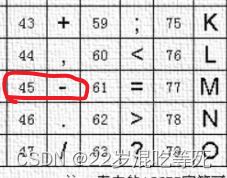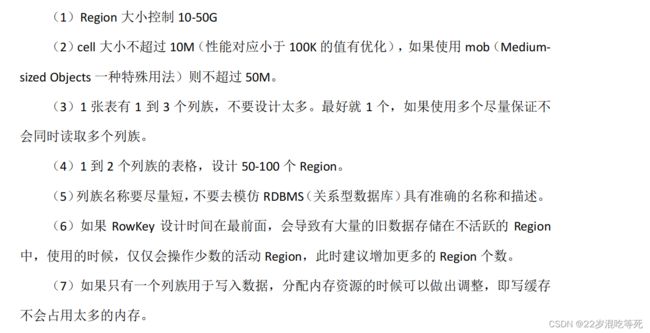第 5 章 HBase 优化
5.1 RowKey 设计
一条数据的唯一标识就是 rowkey,那么这条数据存储于哪个分区,取决于 rowkey 处于
哪个一个预分区的区间内,设计 rowkey的主要目的 ,就是让数据均匀的分布于所有的 region
中,在一定程度上防止数据倾斜。接下来我们就谈一谈 rowkey 常用的设计方案。
1)生成随机数、hash、散列值
2)时间戳反转
3)字符串拼接
**需求:**使用 hbase 存储下列数据,要求能够通过 hbase 的 API 读取数据完成两个统计需求。
5.1.1 实现需求 1
为了能够统计张三在 2021 年 12 月份消费的总金额,我们需要用 scan 命令能够得到张三在这个月消费的所有记录,之后在进行累加即可。Scan 需要填写 startRow 和 stopRow:

scan : startRow -> ^A^Azhangsan2021-12
endRow -> ^A^Azhangsan2021-12.
注意点:
(1)避免扫描数据混乱,解决字段长度不一致的问题,可以使用相同阿斯卡码值的符
号进行填充,框架底层填充使用的是阿斯卡码值为 1 的^A。
(2)最后的日期结尾处需要使用阿斯卡码略大于’-’的值

最终得到 rowKey 的设计为:
//注意 rowkey 相同的数据会视为相同数据覆盖掉之前的版本
rowKey: userdate(yyyy-MM-dd HH:mm:SS)
5.1.2 实现需求 2
问题提出:按照需要 1 的 rowKey 设计,会发现对于需求 2,完全没有办法写 rowKey 的
扫描范围。此处能够看出 hbase 设计 rowKey 使用的特点为:
适用性强 泛用性差 能够完美实现一个需求 但是不能同时完美实现多个需要。
如果想要同时完成两个需求,需要对 rowKey 出现字段的顺序进行调整。
调整的原则为:可枚举的放在前面。其中时间是可以枚举的,用户名称无法枚举,所以
必须把时间放在前面。
最终满足 2 个需求的设计
可以穷举的写在前面即可
rowKey 设计格式 => date(yyyy-MM)^A^Auserdate(-dd hh:mm:ss ms)
(1)统计张三在 2021 年 12 月份消费的总金额
scan: startRow => 2021-12^A^Azhangsan
stopRow => 2021-12^A^Azhangsan.
(2)统计所有人在 2021 年 12 月份消费的总金额
scan: startRow => 2021-12
stopRow => 2021-12.
5.1.3 添加预分区优化
预分区的分区号同样需要遵守 rowKey 的 scan 原则。所有必须添加在 rowKey 的最前面,前缀为最简单的数字。同时使用 hash 算法将用户名和月份拼接决定分区号。(单独使用用户名会造成单一用户所有数据存储在一个分区)。
添加预分区优化
startKey stopKey
001
001 002
002 003
...
119 120
分区号=> hash(user+date(MM)) % 120
分区号填充 如果得到 1 => 001
rowKey 设计格式 => 分区号 date(yyyy-MM)^A^Auserdate(-dd hh:mm:ss ms)
缺点:实现需求 2 的时候,由于每个分区都有 12 月份的数据,需要扫描 120 个分区。
解决方法:提前将分区号和月份进行对应。
提前将月份和分区号对应一下:
000 到 009 分区 存储的都是 1 月份数据
010 到 019 分区 存储的都是 2 月份数据
…
110 到 119 分区 存储的都是 12 月份数据
是 9 月份的数据
- 分区号=> hash(user+date(MM)) % 10 + 80
- 分区号填充 如果得到 85 => 085
得到 12 月份所有人的数据
- 扫描 10 次
scan: startRow => 1102021-12
stopRow => 1102021-12.
...
startRow => 1122021-12
stopRow => 1122021-12.
..
startRow => 1192021-12
stopRow => 1192021-12.
5.2 参数优化
1)Zookeeper 会话超时时间
hbase-site.xml
属性:zookeeper.session.timeout
解释:默认值为 90000 毫秒(90s)。当某个 RegionServer 挂掉,90s 之后 Master 才能察觉到。
可适当减小此值,尽可能快地检测 regionserver 故障,可调整至 20-30s。
看你能有都能忍耐超时,同时可以调整重试时间和重试次数
hbase.client.pause(默认值 100ms)
hbase.client.retries.number(默认 15 次)
2)设置 RPC 监听数量
hbase-site.xml
属性:hbase.regionserver.handler.count
解释:默认值为 30,用于指定 RPC 监听的数量,可以根据客户端的请求数进行调整,读写请求较多时,增加此值。
3)手动控制 Major Compaction
hbase-site.xml
属性:hbase.hregion.majorcompaction
解释:默认值:604800000 秒(7 天), Major Compaction 的周期,若关闭自动 Major
Compaction,可将其设为 0。
如果关闭一定记得自己手动合并,因为大合并非常有意义。
4)优化 HStore 文件大小
hbase-site.xml
属性:hbase.hregion.max.filesize
解释:默认值 10737418240(10GB),如果需要运行 HBase 的 MR 任务,可以减小此值,
因为一个 region 对应一个 map 任务,如果单个 region 过大,会导致 map 任务执行时间过长。
该值的意思就是,如果 HFile 的大小达到这个数值,则这个 region 会被切分为两个 Hfile。
5)优化 HBase 客户端缓存
hbase-site.xml
属性:hbase.client.write.buffer
解释:默认值 2097152bytes(2M)用于指定 HBase 客户端缓存,
增大该值可以减少 RPC调用次数,但是会消耗更多内存,反之则反之。
一般我们需要设定一定的缓存大小,以达到减少 RPC 次数的目的。
6)指定 scan.next 扫描 HBase 所获取的行数
hbase-site.xml
属性:hbase.client.scanner.caching
解释:用于指定 scan.next 方法获取的默认行数,值越大,消耗内存越大。
7)BlockCache 占用 RegionServer 堆内存的比例
hbase-site.xml
属性:hfile.block.cache.size
解释:默认 0.4,读请求比较多的情况下,可适当调大
8)MemStore 占用 RegionServer 堆内存的比例
hbase-site.xml
属性:hbase.regionserver.global.memstore.size
解释:默认 0.4,写请求较多的情况下,可适当调大
Lars Hofhansl(拉斯·霍夫汉斯)大神推荐 Region 设置 20G,刷写大小设置 128M,其它默认。
hbase-site.xml文件:
<?xml version="1.0"?>
<?xml-stylesheet type="text/xsl" href="configuration.xsl"?>
<!--
/*
* Licensed to the Apache Software Foundation (ASF) under one
* or more contributor license agreements. See the NOTICE file
* distributed with this work for additional information
* regarding copyright ownership. The ASF licenses this file
* to you under the Apache License, Version 2.0 (the
* "License"); you may not use this file except in compliance
* with the License. You may obtain a copy of the License at
*
* http://www.apache.org/licenses/LICENSE-2.0
*
* Unless required by applicable law or agreed to in writing, software
* distributed under the License is distributed on an "AS IS" BASIS,
* WITHOUT WARRANTIES OR CONDITIONS OF ANY KIND, either express or implied.
* See the License for the specific language governing permissions and
* limitations under the License.
*/
-->
<configuration>
<!--
The following properties are set for running HBase as a single process on a
developer workstation. With this configuration, HBase is running in
"stand-alone" mode and without a distributed file system. In this mode, and
without further configuration, HBase and ZooKeeper data are stored on the
local filesystem, in a path under the value configured for `hbase.tmp.dir`.
This value is overridden from its default value of `/tmp` because many
systems clean `/tmp` on a regular basis. Instead, it points to a path within
this HBase installation directory.
Running against the `LocalFileSystem`, as opposed to a distributed
filesystem, runs the risk of data integrity issues and data loss. Normally
HBase will refuse to run in such an environment. Setting
`hbase.unsafe.stream.capability.enforce` to `false` overrides this behavior,
permitting operation. This configuration is for the developer workstation
only and __should not be used in production!__
See also https://hbase.apache.org/book.html#standalone_dist
-->
<property>
<name>hbase.cluster.distributed</name>
<value>false</value>
</property>
<property>
<name>hbase.tmp.dir</name>
<value>./tmp</value>
</property>
<property>
<name>hbase.unsafe.stream.capability.enforce</name>
<value>false</value>
</property>
<property>
<name>hbase.zookeeper.quorum</name>
<value>hadoop102,hadoop103,hadoop104</value>
<description>The directory shared by RegionServers.
</description>
</property>
<property>
<name>hbase.zookeeper.quorum</name>
<value>hadoop102,hadoop103,hadoop104</value>
</property>
<!-**加粗样式**- <property>-->
<!-- <name>hbase.zookeeper.property.dataDir</name>-->
<!-- <value>/export/zookeeper</value>-->
<!-- <description> 记得修改 ZK 的配置文件 -->
<!-- ZK 的信息不能保存到临时文件夹-->
<!-- </description>-->
<!-- </property>-->
<property>
<name>hbase.rootdir</name>
<value>hdfs://hadoop102:8020/hbase
<description>The directory shared by RegionServers.
</description>
</property>
<property>
<name>hbase.cluster.distributed</name>
<value>true</value>
</property>
</configuration>
5.3 JVM 调优
JVM 调优的思路有两部分:一是内存设置,二是垃圾回收器设置。
垃圾回收的修改是使用并发垃圾回收,默认 PO+PS 是并行垃圾回收,会有大量的暂停。
理由是 HBsae 大量使用内存用于存储数据,容易遭遇数据洪峰造成 OOM,同时写缓存的数
据是不能垃圾回收的,主要回收的就是读缓存,而读缓存垃圾回收不影响性能,所以最终设
置的效果可以总结为:防患于未然,早洗早轻松。
1)设置使用 CMS 收集器:
-XX:+UseConcMarkSweepGC
2)保持新生代尽量小,同时尽早开启 GC,例如:
//在内存占用到 70%的时候开启 GC
-XX:CMSInitiatingOccupancyFraction=70
//指定使用 70%,不让 JVM 动态调整
-XX:+UseCMSInitiatingOccupancyOnly
//新生代内存设置为 512m
-Xmn512m
//并行执行新生代垃圾回收
-XX:+UseParNewGC
// 设 置 scanner 扫 描 结 果 占 用 内 存 大 小 , 在 hbase-site.xml 中,设置
hbase.client.scanner.max.result.size(默认值为 2M)为 eden 空间的 1/8
(大概在 64M)
// 设置多个与 max.result.size * handler.count 相乘的结果小于 Survivor
Space(新生代经过垃圾回收之后存活的对象)

